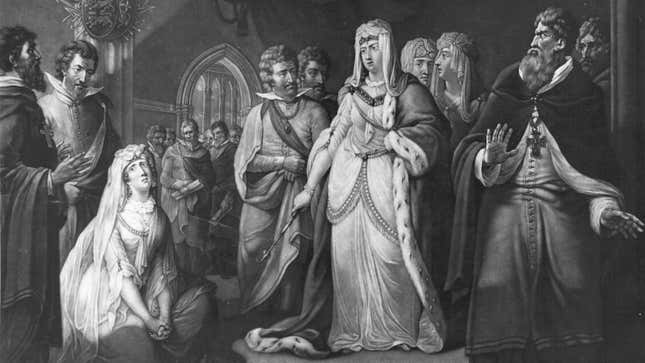Queen Matilda's Real Life Game of Thrones-Style Battle For the Crown
In Depth

Watching Tyrion and Varys argue on a recent Game of Thrones episode about whether a cock is a necessary qualification for a monarch in the universe of Westeros, I wondered how this argument had played out in medieval England, which provided much of George R.R. Martin’s source material. While the highly successful show has often been sucked into larger contemporary conversations about women and power, these storylines about would-be queens also harken back to the historical Middle Ages, when numerous women exercised power— to varying degrees of success.
Fortunately, historian Catherine Hanley has written a biography of Matilda, a woman who attempted to become the first reigning queen of England—as opposed to the wife of the king—and was willing to answer some of my questions.
Matilda is a fascinating figure. The daughter of King Henry I of England, she had been sent to Europe as a child to marry the man who’d become Holy Roman Emperor Henry V, amassing immense political, diplomatic, and governing experience. Her husband died and the pair had no children, leaving Matilda at loose ends. As it turned out, her father found himself without an heir, thanks to the White Ship disaster in 1120—which killed her older brother and lots of other aristocrats when their booze cruise unexpectedly sank. Despite Henry I taking a second, much younger wife, Matilda was his only living legitimate child and therefore his chosen heir.
All very dynastically straightforward—except, of course, for the fact that Matilda was a woman. As Hanley explains, medieval women did in fact routinely exercise power, and succession could be routed through women, but they couldn’t hold power or sovereignty in their own right. It had to be under the auspices of a man. (Hello, Sansa!) Ultimately, when Henry I died, Matilda’s cousin Stephen of Blois essentially stole the throne right out from under her. But she refused to cooperate and spend the next twenty years fighting Stephen and his allies. She never managed to get the crown for herself—but in the end, she did manage to get her son onto the throne, which isn’t too bad a result for a rebellion against a medieval king.
I asked Hanley about Matilda’s quest for her own non-Iron Throne. Maybe Game of Thrones could have used a crib sheet?
So, Matilda is the only living legitimate child of the reigning monarch after her brother dies, and she’s very qualified—she’s been the empress in Europe, she has a lot of political experience. And yet, she doesn’t end up on the English throne when her father dies. What happens that the crown does not go to her?
Not only was she the only legitimate child of the king, but he’d also officially designated her his heir, and all the lords and the barons had sworn an oath that they were going to uphold her rights. And as you say, she was very qualified. She’d been the empress of what we would now call the Holy Roman Empire since she was 8 years old. By the time she was 16, she could speak three languages and the emperor had left her in charge of ruling Italy. By the time her father died, she was in her early 30s, and if you’d offered most medieval kings the chance to leave their throne to an heir who was 30ish, experienced, multi-lingual, with all this international political experience, they would have bitten your hand off!
All these baron had sworn they were going to support her rights, and basically as soon as Henry I died they sort of went, Oh! A woman! We can’t have this! Then there was some debate over, well, if not her, then who? And her cousin Stephen basically won the race. Stephen was Henry I’s nephew, the son of his sister, and he was actually not even the oldest son in his own family. He’d been shown a lot of favor by the king, and he obviously just thought to himself, This is a great opportunity for me. I’m the old king’s nephew, I’m male. He basically rushed across the channel and secured the treasury, the money, and then rushed and got himself crowned, and then once the crown was on his head, that was it, he was the king!
Matilda could have given up. It would have been quite easy to give up, to go, Oh, hang on, I’m stuck 200 miles away--she was in Anjou, in France at the time—and somebody else has been crowned and he’s a man and nobody seems to be arguing on my behalf. Maybe I should just stay here. But quite clearly she wasn’t that kind of woman. She wasn’t just to sit by and let somebody else steal her rights. And so instead of taking this lying down, she decided to start a war about it. Good for her! She didn’t have any dragons, sorry.
-

-

-

-

-

-

-

-

-

-

-

-

-

-

-

-

-

-

-

-

-

-

-

-

-

-

-

-

-

-

-

-

-

-

-

-

-

-

-

-








































